Dog Hiccups at Night – Cause for Concern? [The Truth]
If you saw someone hiccup while you’re at a restaurant, what would you do? Would you laugh and joke about it? Or would you freak out and try to get help?
Is it normal for dogs to hiccup? Could it be a medical emergency? What to do when a dog hiccups at night? If you’re a first-time pet parent, you’re probably consumed by worry with each dog hiccup.
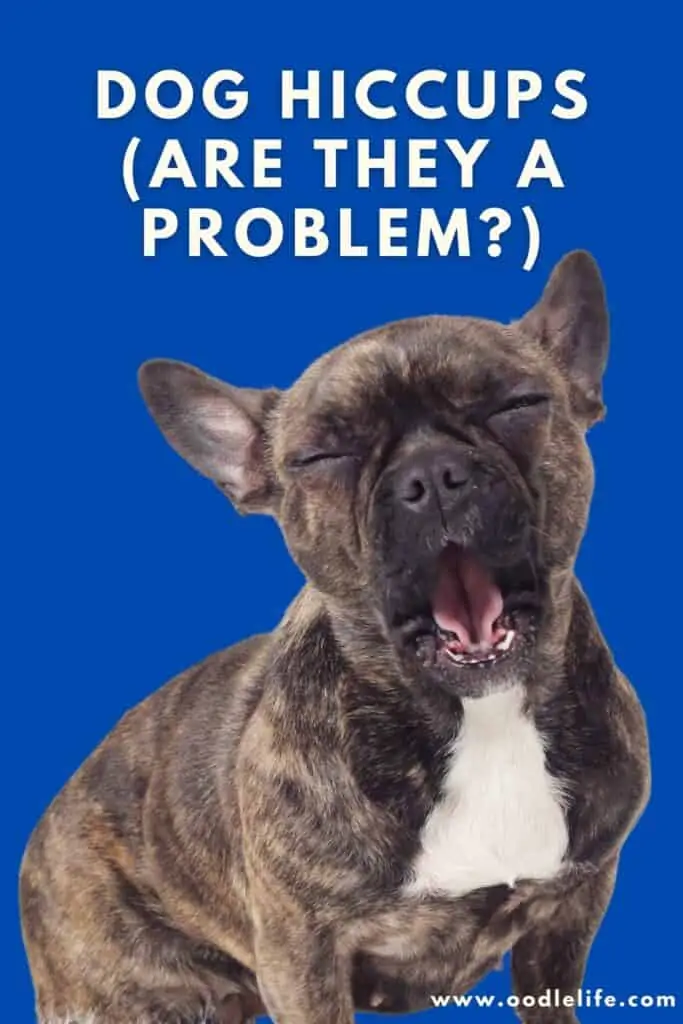
Hiccups are a common occurrence, so much so that we don’t seem to pay much attention to them. But that’s acceptable when it comes to human beings. What if your dog gets hiccups?
Questions like these will probably worsen your anxiety. We’ll make things a little easier for you by sharing that hiccups are normal for dogs in most cases.
Before you dismiss your concerns entirely, do read a little more. It’s always helpful to be able to identify when or why something like hiccups is or isn’t a concern.
The Science Behind Hiccups [Dogs and Humans]
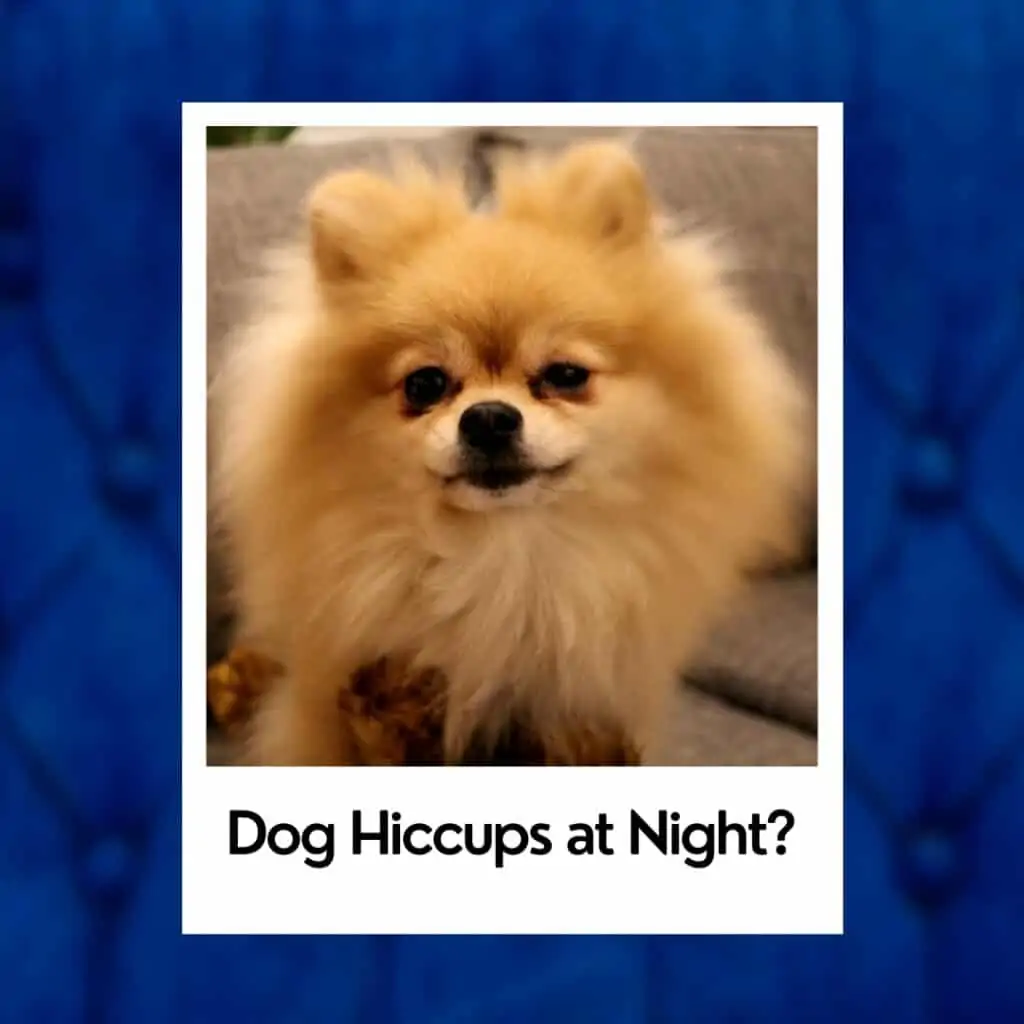
Hiccups are a funny sight for the non-affected person. Best case scenario, you hiccup a few times, glug down a glass of water, and you’re all right. However, in many cases, hiccups can be very uncomfortable, especially if they drag on for extended periods. Just as the duration and severity of hiccups can be different for different people, the same is the case for dogs.
Most people believe hiccups are a result of eating or drinking too fast. Some people attribute hiccups to carbonated beverages or alcohol consumption. There is a superstition that a person hiccups when someone is thinking about them.
While some of these are partly right and others are cute and belong in romantic novels and movies, trust science to explain why hiccups occur.
Hiccups are caused when your diaphragm contracts all of a sudden, shutting your vocal cords for a brief moment. It is the reason why you hear the hiccup sound-it’s a muted version of a cough. In some, hiccups are a symptom of irritation to the vagus or phrenic nerve.
Hiccups aren’t so funny anymore, are they?
But yes, this irritation can be caused by eating too fast, eating extremely spicy food, drinking too much, excessive eating, etc. All of the above-listed incidents could irritate your diaphragm, causing you to get hiccups.
Stopping hiccups is not very difficult. Some quick-fixes include holding your breath while covering your nose and mouth, rinsing your mouth, quickly drinking a glass of water, etc.
It is all rational and doable for when you and me. We are humans, after all. But what of dogs?
Can Your Dog Get Hiccups?
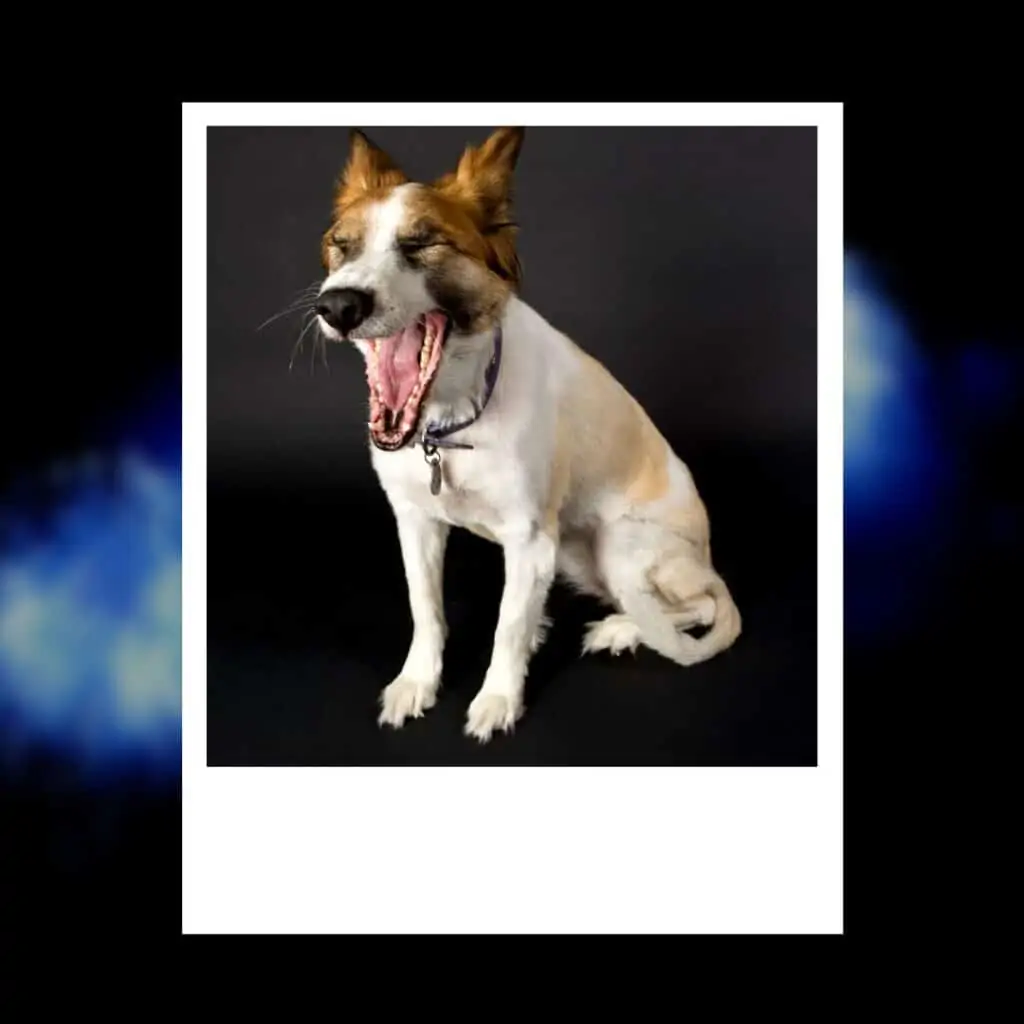
Usually, dogs get hiccups for some of the same reasons as humans-they eat or drink very quickly. This is particularly true for young pups. If your dog is very excited about something, that can cause hiccups too.
Sometimes stress can also irritate your dog’s diaphragm, resulting in hiccups.
Hiccups can be a good thing -they help clean and clear out any stomach gas upsetting your dog. Typically hiccups last for a few minutes at most, in which case there isn’t any reason to freak out.
Dogs don’t seem to be bothered by hiccups. However, as a pet parent, it becomes your responsibility to observe his hiccups’ frequency and duration. Just like with human beings, hiccups in dogs are not a cause for much panic.
Especially with puppies. They hiccup for several reasons, including growing lungs and esophageal development. Some pet owners even find the hiccupping cute in growing dogs.
Why Do Dogs Get Hiccups?
Hiccups are an involuntary response to something that may irritate your dog’s diaphragm. Now that something could be a variety of things.
To name a few:
Extreme Excitement
If your dog gets excited very often, it could result in hiccups. Here’s why. Excitement is a direct result of raised energy levels which can cause your dog to bark a lot. Excessive barking leads to an excess intake of air, which could cause an involuntary contraction of the diaphragm, leading to hiccups.
Speed Eating
Sometimes, especially in puppies, dogs tend to get excited and gobble their food. The same can also be said for their water intake. This can force excess air into their stomachs, pushing the stomach against the diaphragm. This diaphragm could then feel an irritation which could cause the dog’s vocal cords to shut briefly, resulting in a hiccup. If you observe that your dog starts hiccupping immediately after gobbling up his dinner, you won’t need to wonder why.
Stress
Dogs also undergo stress, just like we humans do. Stress can cause muscles to twitch and contract randomly, without us realizing it. Stress causes the body, whether dog or human, to produce hormones that can irritate the nerves connecting the diaphragm. Dogs have nightmares, too. This causes stress while sleeping, which could abruptly cause hiccups in his sleep as well. Worry not, for it may not even wake him.
Medical Conditions
There is a very slight chance that your dog could have hiccups because of an underlying medical condition that you may have missed or been unaware of. It happens very rarely, but it is a possibility. Brain trauma or meningitis are some examples of brain diseases that can lead to hiccups in dogs.
Don’t confuse coughing or kennel cough with a dog hiccup. A cough symptom needs to be investigated by your Veterinarian.
Some liver diseases can also cause diaphragm irritation. However, it is essential to note that this is an extremely rare possibility. It would be wise for you to visit the vet before you go into full-on panic mode.
Irritants
We often overlook how cleaning solvents, air purifiers, scented candles, cigarette smoke, etc. can affect our pets. Try eliminating some or all of these from your home if your dog seems particularly susceptible.
Why Do Dogs Get Hiccups at Night?
Hiccups occur without any prior notice. If you’ve ruled out all other causes like speed eating, drinking, stress, etc. but cannot explain why your canine buddy has hiccups at night, consider the following:
Diet
Your dog’s food might have an irritant that’s causing the hiccups long after he’s done eating. If he is eating that same food for dinner every night, it would explain the ‘cued’ hiccups. The simplest solution, in this case, would be to try switching his diet up a bit until you find one that sticks.
Temperature
Your pup could hiccup if the temperature swings wildly at night. Sudden onset of cold could unsettle your pooch. Adjust the temperature setting in your room or house and observe how it affects your pup. You could also avoid cold baths, food, and water if you’ve identified this to be the cause of the hiccups.
Nightmares
If your dog is experiencing bad dreams while he sleeps, it may cause him some stress. As mentioned above, stress can cause muscles to contract due to the release of chemicals. It can affect the diaphragm, causing an uncontrollable reaction such as hiccups.
Excitement
As you would know, dogs have much more heightened hearing compared to human beings. In the silence of the night, your dog may hear something which may excite him. In that excitement, he can start barking uncontrollably. In such cases, the extra intake of air could cause hiccups. If you notice any hiccups after a barking session, try to ensure that your house is quiet after dark, or play some soothing music to drown any unwanted outside sounds that might excite your puppy.
Medication
If you are giving your dog any medication at night, he may be getting these hiccups as a side effect of that. It shouldn’t be a cause for concern as long as your dog doesn’t seem to be getting irritated or upset because of it. You could consider asking your vet to change the medication if it upsets you or causes a more severe reaction in your furball.
Parasites
One lesser-known cause for hiccups is, you guessed it. Little wriggly worms. If you haven’t religiously followed the deworming schedule, it’s time to begin. One of the easiest ways to determine this is to see if your dog has accompanying symptoms like vomiting, diarrhea, etc. Most pet parents don’t take parasites seriously. Be advised though, some can cause irreversible damage to your furball’s insides, especially their respiratory tract.
How Often Do Dogs Get Hiccups?
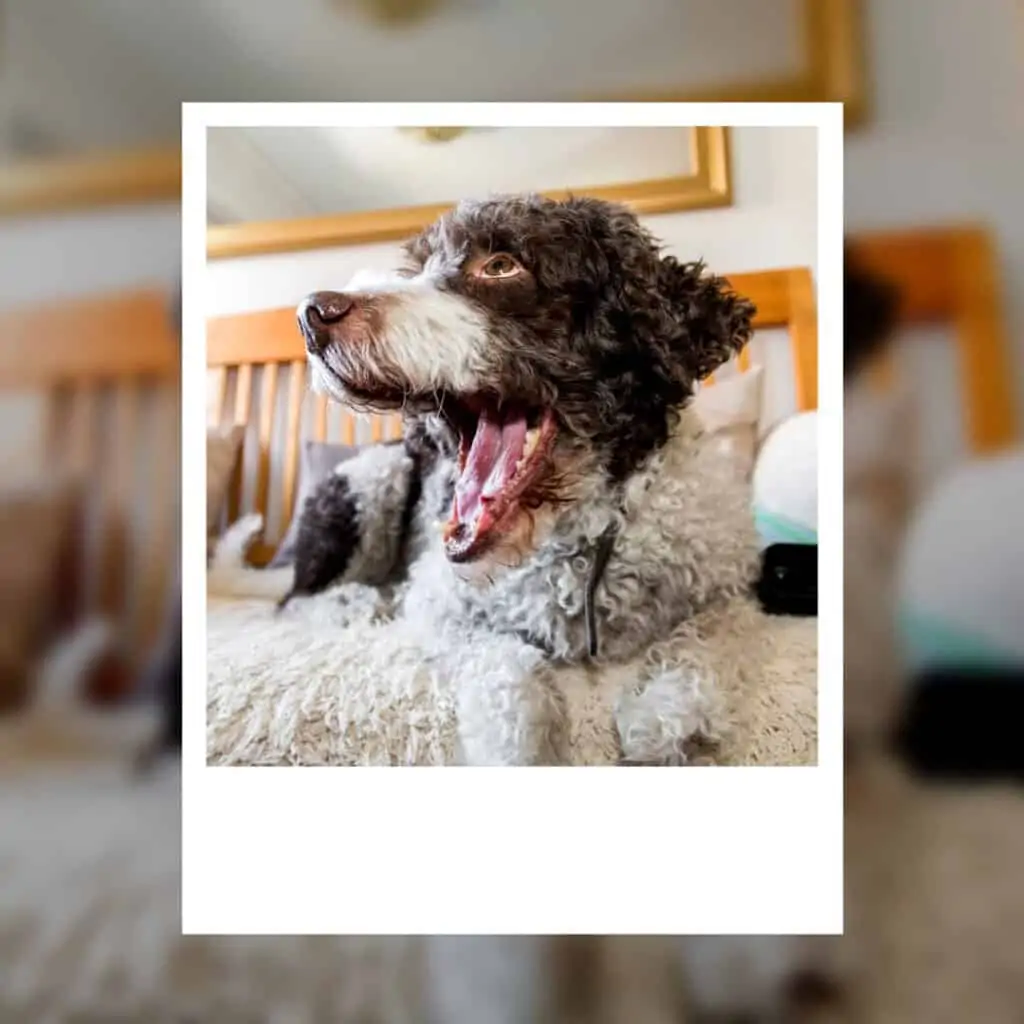
Hiccups are a common occurrence in puppies or young dogs and not a cause for panic. As explained earlier, hiccups can simply be a sign of maturing body systems and muscles. As your dog gets older, he will outgrow this.
Puppies are also more susceptible to hiccups as they have high levels of energy. The excitement in general, or when eating and drinking, can cause hiccups.
Almost all dogs get hiccups at least once when they are young. It’s impossible to avoid it. You can expect them to outgrow hiccups from growing pains by the time they reach their first birthday.
What to Do When Your Dog Gets Hiccups?
In most cases, dogs hiccup for about a minute or so before they settle. This doesn’t mean that you’ll never come across an extended hiccuping session that will agitate your dog. At times like these, it is helpful to know what you can do to get the hiccups to stop. Similar to humans, there’s a hiccup cheat-trick list for dogs as well.
Distraction
Distraction always works. If your dog is experiencing hiccups for a long time, try to distract him with a chew toy or play a game. You can even tickle him. Take his mind off of the hiccups and watch them vanish.
Water
Water has proven to be one of the most effective methods to settle hiccups. When your dog gets the hiccups, give him a little water to drink, and he should be fine. Drinking water practically forces breathing regulation, which would stop the hiccups. If your canine buddy doesn’t seem inclined, adding some honey or sugar to the water might entice him to drink.
Some dogs to just gulp air when they drink water. THis can resule in an upset stomach as the gulping ingests lots of water. Be careful about this.
Don’t offer your hiccuping sweetheart any solids, though. This could increase the risk of choking. Avoid sugar substitutes as they have products that are generally harmful to dogs.
Calm Your Dog’s Breathing
Your dog could experience hiccups as a result of irregular breathing. Try calming him down to regulate his breathing. Enclosed crates work well as they instill a sense of peace. If loud sounds, like fireworks, upset your dog, close all doors and windows and play some light music to drown out the sounds. If you have guests or other new pets, quiet rooms and some time away from the chaos should help.
Reconsider Food and Water Bowls
If you connect the hiccup bouts to quick eating, try a feeding bowl that is designed to slow down super quick eaters. Also, check the height of the water bowl. Since the excess intake of air is one of the causes of hiccups, changing placement – higher or lower – could help settle how often your canine buddy gets hiccups.
When Are Dog Hiccups Considered Serious?
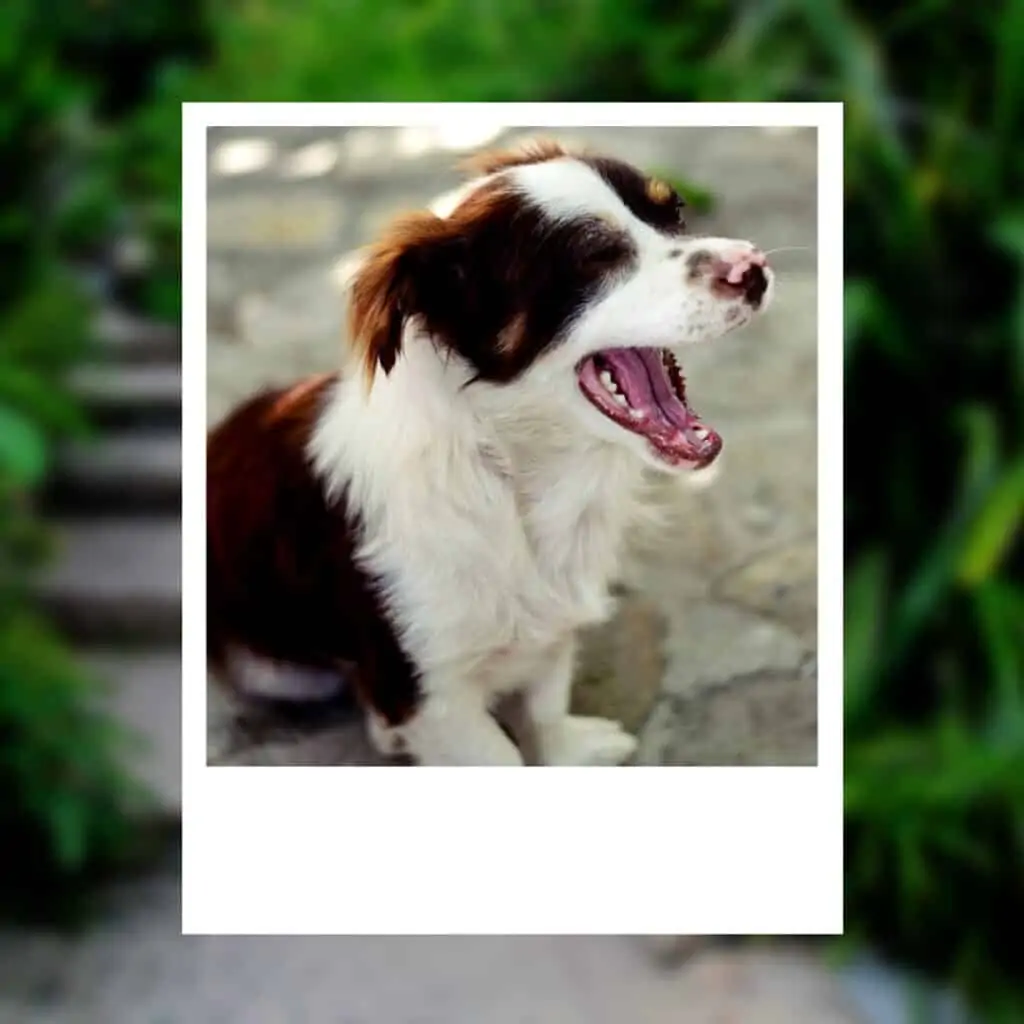
Ideally, dog hiccups go away in a few minutes, 10 to 15 minutes at most. However, if the hiccups don’t resolve by themselves and all of the tips mentioned above don’t seem to be working, it may be time to consider taking him to the vet. You should also monitor your dog for accompanying symptoms, like vomiting or breathing trouble.
Puppy hiccups that are uncontrollable spasms, hyperventilation or associated with vomiting require a trip to the vet. Chronic hiccups can also stress the braething or result in spasm of the diaphragm muscle of your pup – so getting them dealt with soon is ideal.
Relentless sneezing, rapid breathing, or any other change to the dog’s breathing pattern should also result in a trip to the Vet – don’t rest on your laurels if you think that the persistent hiccups are actually a respiratory problem.
There still may not be any reason to panic, but once the vet officially rules out anything serious, you can relax.
Some dogs just burp, cough or hiccup. An older dog can develop a hiccup over time which can confuse an owner who is not used to the noise.
You can then question your vet to understand the what, why, and how. Your vet will be able to further assist you on how to ease any discomfort your pet might be experiencing due to hiccups.
Some Dog Breeds are Prone to Hiccups
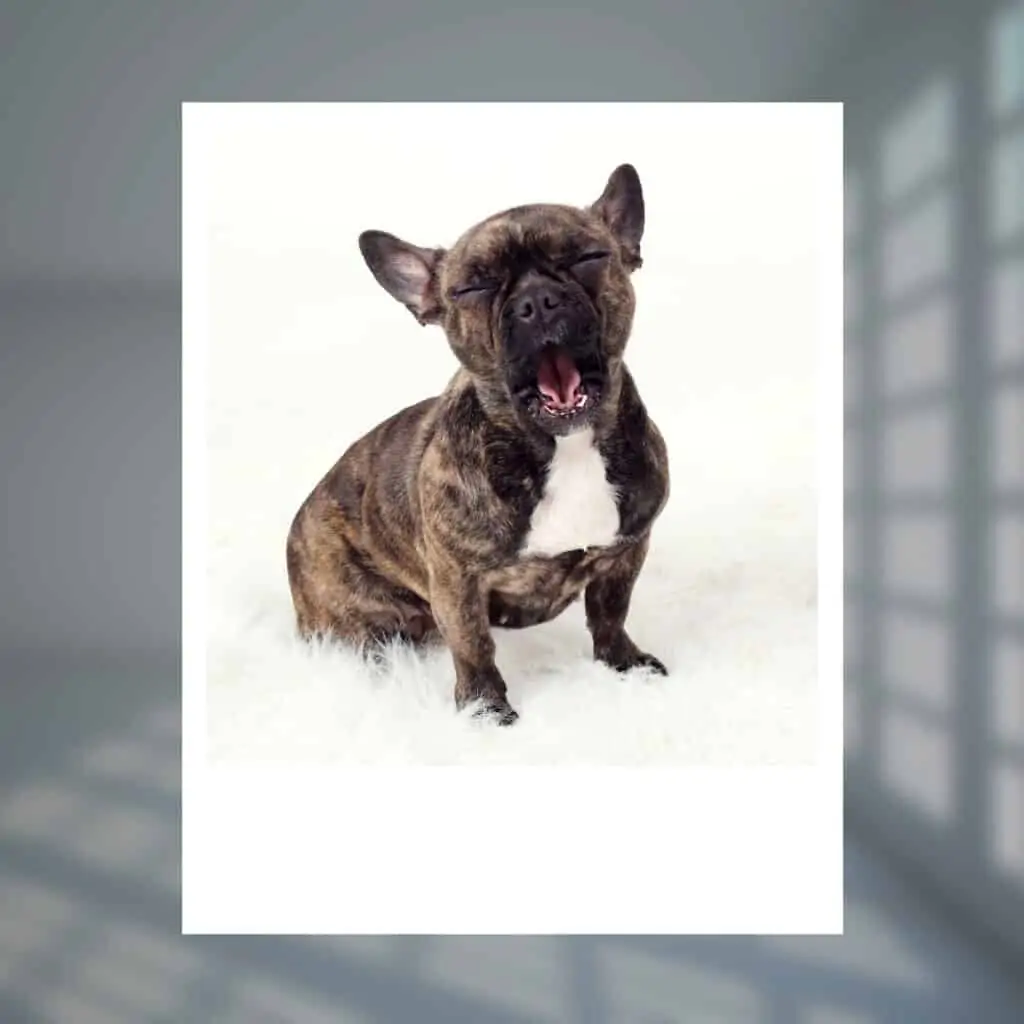
Did you know that hiccups can be found in a variety of dog breeds? They are more common in smaller dogs and toy breeds, but medium to large sized dogs also experience them.
Most Common Dog Breeds With Hiccups:
- French Bulldog
- Shih Tzu
- Pug
- Pomeranian
- Cavalier King Charles Spaniel (And Cavapoos!)
- Chihuahua
- Yorkshire Terrier
- Bichon Frise
- Brussels Griffon
- Maltese and Shihtzus!
Frenchies (French Bulldogs) get them in particular because of how their airway is shaped. Their larynx and trachea are large and located uniquely in the throat, which can even make it difficult to breathe when they hiccup.
Pugs often have trouble breathing entirely because of how short their noses are. This causes them to be susceptible to hiccups that make breathing even more difficult for a small dog who has already limited space due to its nose size.
Shih Tzus and Shih-Poo dogs also get these types of hiccups from time-to-time. This does mean Shih Tzu owners should take extra caution if trying new foods or eating too quickly.
The Bottom Line
Hiccups are normal in both puppies and human beings. There is absolutely no need for you to panic if your dog gets hiccups now and then.
For dogs, hiccups are not harmful, and most would barely even be affected by them, so there is no reason for you to be.
Hiccups, though not a big issue, shouldn’t be dismissed altogether. If your dog has hiccups, keep a close eye on him to ensure that there isn’t a serious underlying cause.